I’m out for black presidents to represent me
Note: This article was written during the final weeks of Obama’s last term.
January 19, 2017
For 2,922 days the United States existed in a state of anomaly: its president was black. Alright, the brother was light brown and he had a white mother and he descended not from slaves but from Kenya, but no one, neither his supporters nor his opponents, let him forget that when they saw him–they saw black. Both Cornell West and Ben Carson agreed that he was not black enough. Ta-Nehisi Coates, one of the chief essayists of the president’s two terms in office titled his retrospective “My President Was Black.”
Last September, Pres. Barack Obama helped open the National Museum of African-American History and Culture, which concludes its journey through centuries of black oppression and achievement with a shrine to the president and his family. And for each of those 2,922 days I held pride and admiration for the only president ever to look like me.
When Obama won the highest office in the land more than eight years ago, I ran through the halls of my middle school with unabashed glee. We had spent so much time imagining what this might mean, my friends and I, if it could really happen. We dared to dream a little bigger until finally it felt like justice was beginning to flow from the mountaintop. I barely understood his policy positions or his story, but in that moment I felt a kinship with the black people being shown on TV screens screaming in wild jubilation I never had before. Those celebrations shouted the same message playing in my head: “It’s really gonna be one of us!”
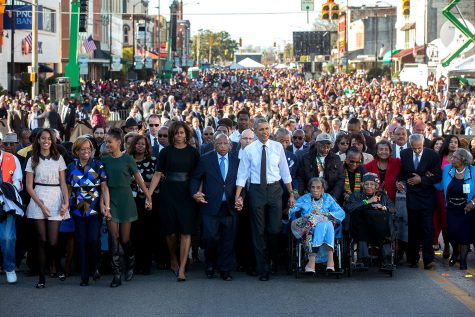
President Obama, First Lady Michelle Obama, Congressman John Lews (D-Georgia) lead marchers through Selma, AL on the 50th anniversary of Bloody Sunday. Photo by Pete Souza/White House
Unfortunately, we have learned how millions of Americans hated sharing the People’s House with one of us. Tupac Shakur rapped, “And although it seems heaven-sent/We ain’t ready to see a black president.” He did not live to see his words proved true.
Racists hounded Obama as illegitimate, inherently untrustworthy, anti-American and utterly criminal for reasons which hardly ever went beyond the color of his skin. Studies show anti-black racism potently increased in the aftermath of a black man, typically held near the bottom of American society, becoming our chief executive.
On the first day of his presidency, Republican leaders vowed to practice scorched earth politics and deny the mandate of the largest popular vote winner in U.S. history. They revoked his right to appoint a Supreme Court justice, attempting to give him three-fifths of a presidency. I write just prior to the inauguration of Obama’s successor, a man who founded his political career by demanding the President of the United States show his birth certificate.
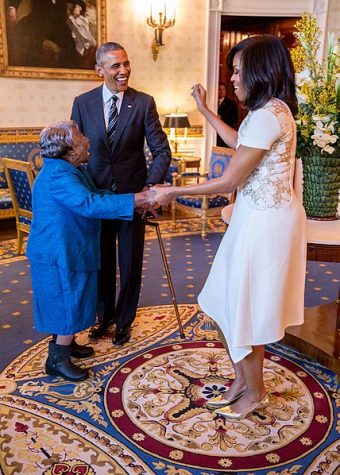
Watching all of this unfold took its toll, but the president himself often reminded me that though he, myself and millions more may always be despised in our country for our race, we will never be any less worthy of the respect and equality too often denied us. As a candidate he delivered his famous “More Perfect Union” speech, charting a path through black pain and oppression while pushing for America to finally engage in an honest conversation about race.
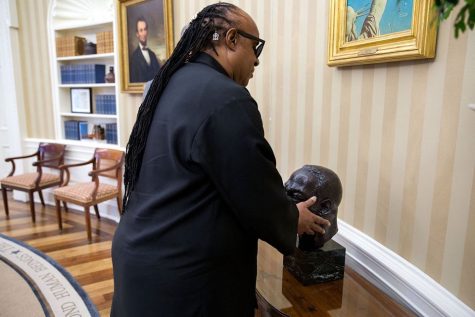
Stevie Wonder feels a bust of Martin Luther King Jr inside the Oval Office. Photo by Pete Souza/White House
After Trayvon Martin’s killer walked free, President Obama used his pulpit to try and explain the black outrage brewing nationwide for the boy Obama said could have been his son or even him. On a podcast he noted that racial progress is “not just a matter of it not being polite to say ‘nigger’ in public.” His two black Attorneys General, Eric Holder and Loretta Lynch, aggressively enforced civil rights laws and investigated discriminatory practices such as the Ferguson, MO, police department plunder of black citizens.
Hesitant to directly address race early in his presidency, Obama could not stay quiet as the Black Lives Matter movement gathered national attention and support. He spoke about our need to care for black folks before “a CVS burns and we don’t just pay attention when a young man gets shot or has his spine snapped.”
Following the racist massacre of nine innocent black people in Charleston, S.C., Obama delivered the eulogy to Rev. and state senator Clementa Pinckney. In his best black preacher cadence, the President honored his friend while reminding us all of the continued need for systemic change for black people across the nation. When he slowly burst into singing “Amazing Grace” my secular heart overflowed with love. He launched a task force on 21st century policing, led the push to reduce discrepancies in drug enforcement which had dismantled black families and neighborhoods, and invited prominent black criminal justice advocates to the White House on multiple occasions to discuss avenues for progress.
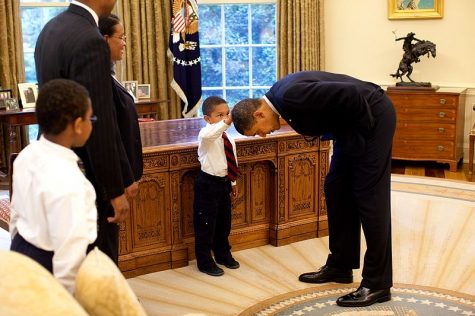
One thing as important as Obama’s executive authority was his symbolic stature. I will never forget images of black kids staring in awe at the President who looked like them, or the small boy who felt Obama’s hair and realized it felt like his own. The first time I trekked to the White House last October, Obama was hosting a BET party I would later read about several times. Each retelling was a jubilant celebration of blackness, black artists, black progress and black struggle, presided over by a man who had been made to carry so many of our hopes and dreams. Barack and Michelle Obama danced with an 106-year-old black woman who never thought she would live to see people like her occupy the White House, let alone get to meet them. Obama requested Kendrick Lamar and Janelle Monae perform for Independence Day, had a bust of Martin Luther King Jr. moved into the Oval Office, and generally embraced black culture in a way no president could before.
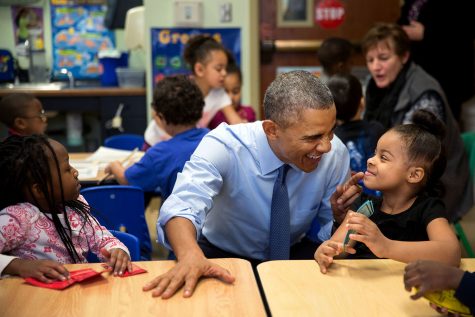
I will always be grateful that Obama’s presidency coincided with my formative years. He profoundly influenced my political beliefs, made me smarter, more compassionate, more willing to disagree with people I admire, and better able to understand the world around me. He helped me raise my head high as a black person in a nation where simply affirming that our lives matter inspires outrage and resistance. When giving the commencement speech at Howard University last summer, he was black excellence on full display. His message was a reminder that there is no one way to be black, that we are connected by our oppression and that we must continue to lift every voice and sing long after his time is over.
During his farewell address, Obama said “when minority groups voice discontent … they’re not demanding special treatment, but the equal treatment our Founders promised.” That will be my takeaway from eight years with Barack Obama. That all of us have a shared birthright in the United States which has never been freely given to us, one that the coming administration may attempt to revoke. We all deserve equal justice in every realm of public life and must fight until we all have it. No, black people did not enjoy full equality during the Obama presidency, but we have made progress, been afforded real chances to strive and knew that our leader was sympathetic to our pains, open to working with us, cared enough to try and right historic wrongs. He has given a generation of Americans a new view of what leadership can look like and inspired so many of us to live our best lives. Let no one tell us ever again that there is anything black people cannot do and do well.
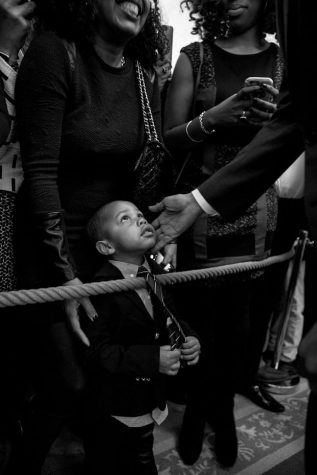
To echo Larry Wilmore, let me say farewell Mr. President. Living in your time will always be one of my life’s greatest honors. For all of us standing behind you, you did it, my nigga.






